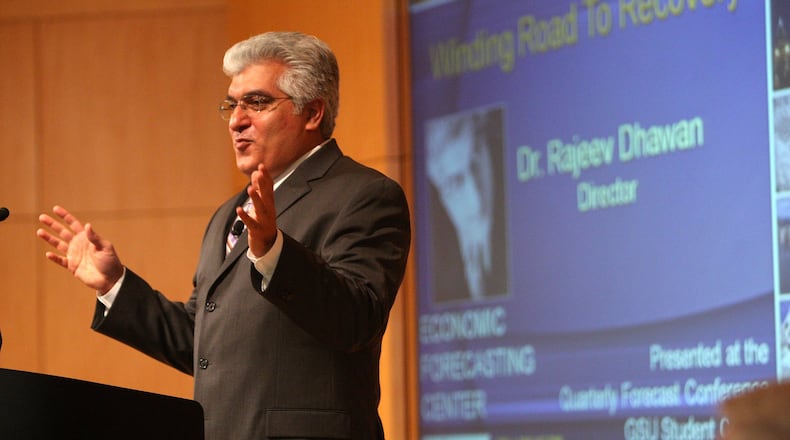The Federal Reserve’s determination to cut inflation can only end later this year with job losses and an economic slowdown, if not a full-fledged recession, according to the Economic Forecasting Center at Georgia State University.
But the pain will not be spread evenly, said Rajeev Dhawan, the center’s director.
“This is going to be a white-collar job recession,” he said Wednesday. “No one will be laying off bartenders and servers or managers of hotels.”
Georgia’s economy has continued to add jobs thus far. And the state is in position to ride out the downturn with less pain than many other states, thanks to a boom in factory expansions and growing trade traffic through the Georgia ports, he said.
The return of leisure travel and in-person dining has so far also bolstered hospitality, Dhawan said. Nobody will get rid of their person-to-person contact workers.”
But even while the tide of overall hiring has continued to rise, an undertow began several months ago with a series of layoffs at a host of high-tech firms — including many with an Atlanta presence, like Facebook, Greenlight, Twitter and Google, he said during the center’s quarterly forecasting conference.
Those cuts — coming with continued hikes in the price of food and other staples — foreshadow more selective spending by many consumers, Dhawan said. “Walmart and Home Depot are sounding the alarm about what people will be spending down the road. People are economizing as inflation eats more of their budgets.”
The disjointed nature of the economy means it may not look like past recessions, but even so, the state will end this year with fewer jobs than it started, Dhawan said. “Almost every sector will be negative in 2023.”
Congress gave the Fed a dual mandate, aims that often conflict: tamping down inflation and promoting job growth.
Through the first two years of the pandemic, the Fed strained to protect the labor market, but as inflation grew and stubbornly persisted, it started fighting inflation. Since late 2021, the Fed has lifted short-term interest rates from near zero to 4.57%. Those rates are passed from the huge banks to other borrowers and then to consumers in the form of mortgage and credit card rates.
The higher the cost of borrowing, the less the incentive for companies to invest or for consumers to take on debt. Historically, most concerted Fed rate hike campaigns eventually mean less consumer spending, less corporate expansion, more layoffs and a recession.
Dhawan predicted three more Fed hikes this year.
Kevin Kliesen, an economist at the Federal Reserve Bank of St. Louis who also spoke at the conference, said the Fed’s rate-setting committee knows it is trying to thread the needle, hoping to raise rates enough to chill inflation without causing a painful recession. But it also wants to stick with its goal.
“The Fed is cognizant of its 1970s error, the stop and go,” he said. “There is a two-sided risk.”
Higher rates threaten the housing market, partly by keeping current homeowners from selling, said John Hunt, principal in MarketNsight, which tracks housing markets around the Southeast.
The biggest problem is the mismatch between the number of people who want to own a home and the number of homes for sale, he said. “There was a housing shortage before the pandemic and the pandemic only made it worse. You need 63,000 additional units of inventory in metro Atlanta on the ground right now.”
The number of homes on the market is historically low, but higher rates convince people who own houses not to go looking for a new homes, Hunt said. “Homeowners are sitting on a lot of equity and they are not going to give that up, then might go from a 3% mortgage rate to a 6% mortgage.”
Forecast for Georgia, 2023
Total jobs: -7,500
Forecast for Georgia, selected sectors
Professional and business: -7,900
Transit and utilities: -3,100
Manufacturing: -3,400
Leisure and hospitality: -1,000
Retail: -5,800
Education and health: +10,800
Government: +9,000
Georgia jobs since Feb. 2020
Total jobs: 176,000
Georgia jobs since Feb. 2020, selected sectors
Leisure and hospitality: -2,000
Retail: -100
Construction: +5,000
Education and health: +21,000
Government: -9,000
Source: Georgia State University Economic Forecasting Center
About the Author
Keep Reading
The Latest
Featured



